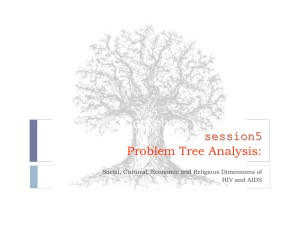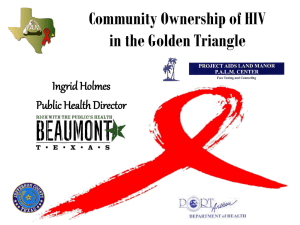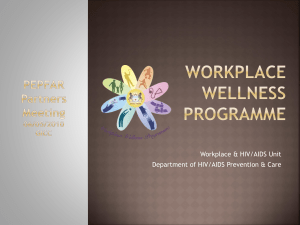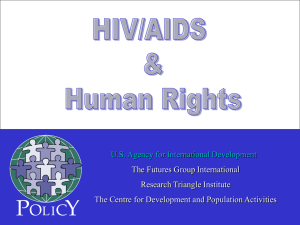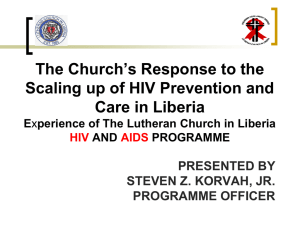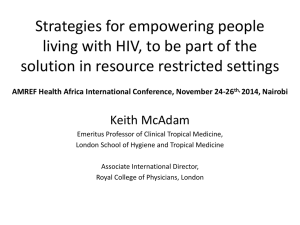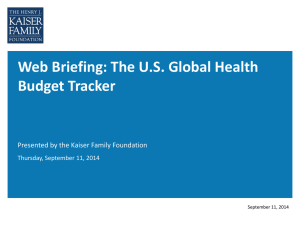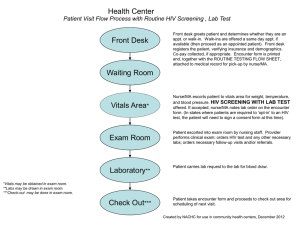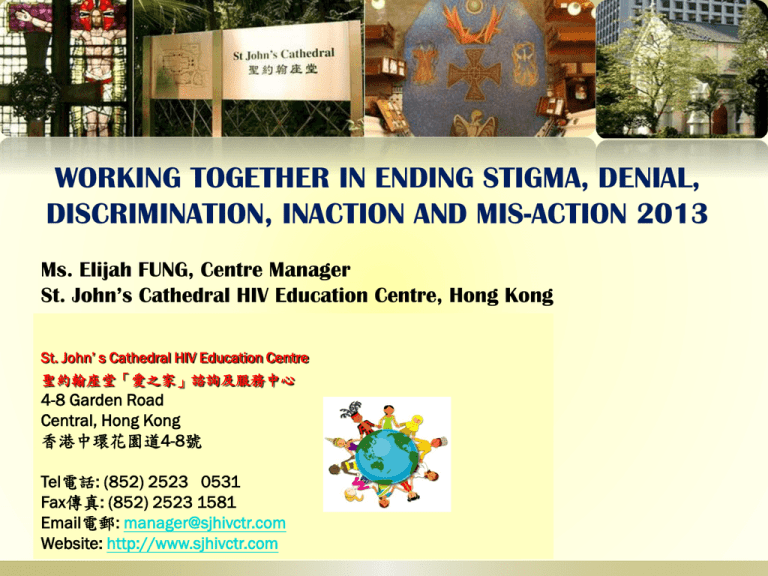
WORKING TOGETHER IN ENDING STIGMA, DENIAL,
DISCRIMINATION, INACTION AND MIS-ACTION 2013
Ms. Elijah FUNG, Centre Manager
St. John’s Cathedral HIV Education Centre, Hong Kong
St. John’ s Cathedral HIV Education Centre
聖約翰座堂「愛之家」諮詢及服務中心
4-8 Garden Road
Central, Hong Kong
香港中環花園道4-8號
Tel電話: (852) 2523 0531
Fax傳真: (852) 2523 1581
Email電郵: manager@sjhivctr.com
Website: http://www.sjhivctr.com
According to the Joint United Nations Programme on
HIV/AIDS, in 2011 an estimated 34 million people
were globally living with HIV, 2.5 million people
became newly infected with HIV, and 1.7 million
people died of AIDS-related illnesses.
Epidemics are still driven by specific behaviours
that put people at higher risk of HIV infection
Nearly 5 million people were living with HIV in
South, South-East and East Asia combined in 2011
Key Populations are central to the
region’s HIV epidemics
HIV epidemics in Asia and the Pacific remain largely
concentrated among injecting drug users, men who
have sex with men (MSM) and sex workers.
E.g. Injecting drug use in Pakistan (>25%)
In Indonesia (>35%)
MSM (>15% in Vietnam; 8% in Indonesia and
> 5% in Bangladesh, Philippines and Malaysia)
Source: “Regional fact sheet 2012, UNAIDS”
Key Populations are central to the
region’s HIV epidemics
In Papua New Guinea,
HIV prevalence rate among sex workers is nearly 20%
to a national HIV adult prevalence of about 1%
In Myanmar, almost 10% of sex workers are living
with HIV compared to a national prevalence of
about 0.5%.
Stigma and discrimination
impeded effective HIV responses
In Myanmar, about 18% of people living with HIV
verbally insulted and 10% were physically assaulted
as result of their HIV status
In Nepal, about 12% of people living with HIV
reported losing a job or income on the basis of their
HIV status
Improved laws and policies
to protect people living with HIV
Since 2010, China, Fiji and the Republic of Korea
have all repealed travel restrictions for people living
with HIV, bringing national laws in line with
recommended international norms
India, Indonesia, Papua New Guinea and Thailand
have put in place programmes to ensure that law
enforcement does not act as an obstacle to HIV
treatment and prevention
Country-level progress in new HIV infections
in Asia Pacific region
Cambodia, India, Malaysia, Myannmar, Nepal, Papua
New Guinea and Thailand, the rate of new HIV
infections fell by more than 25% between 2001 and
2011
In Bangladesh, Indonesia, The Philippines and
Sri Lanka, the HIV infections increased by more than
25% between 2001 and 2011
Data on Migrant workers infected in Sri Lanka
HIV/AIDS & Reproductive health project for
Migrant Community in Hong Kong
Since 2004, the St. John’s Cathedral HIV Education
Centre has been working along side the migrant
community in Hong Kong by providing:
(1) AIDS & reproductive health
talks/workshops/seminars;
(2) Outreaching activities:
annual AIDS Festival; distributing of AIDS information,
condoms and materials;
(3) Empowerment
e.g. training on patients’ rights, equal opportunities,
access to services in Hong Kong;
HIV/AIDS & Reproductive health project for
Migrant Community in Hong Kong
(4) Conduct research on issues surrounding migration
and health;
(5) Advocacy Campaign with our international and
regional partners such as CARM Asia and its partner
organizations in 18 countries; ARROWS for Change,
UNAIDS, United Nations Development Programme
(UNDP), Christian Conference of Asia (CCA), PWRD
in Toronto, World Council of Churches (WCC), etc.
The HIV Education Centre of the St. John’s
Cathedral (Anglican Church in Hong Kong )
The HIV Education Centre of the St. John’s Cathedral
(Anglican Church) was the first faith-based institution to
undertake the AIDS ministry in Hong Kong, and it is one of
the outreach ministries of the Cathedral. It strives for a zero
HIV infection, zero discrimination community since 1995
Services offered by the Centre include:
AIDS & Reproductive health
Sex Education for youth
Research
Interfaith cooperation
Practicum
Talk for school youths
HIV/AIDS & Reproductive health project for
migrant community in Hong Kong
6% of the total HK
population are nonChinese by ethnicity.
Our Centre provides
AIDS & reproductive
health education to
this population.
Workshop on
patients’ rights
Seminar
Information booth
AIDS Workshop
Health festival for Thai
community
The AIDS Festival 2012
2012 「愛之節」
ZERO NEW HIV INFECTIONS, ZERO DISCRIMINATION
愛滋病零感染、零歧視
30 teams involved
Attracted > 2000 participants
- 吸引了30團體參與
-吸引了2,000參加者出席
2013 we celebrated
The 10th AIDS Festival in March
Research Projects
“Working conditions, relationship with employers and health related quality of life of domestic workers in Hong Kong”, 2011-2012
“Health of Our Heroes – Qualitative Study on Access to Sexual and Reproductive Health Services and Information of Women
Migrant Domestic Workers 2010”
“Malaysia vs Hong Kong – Employers’ Perception and Attitudes towards Foreign Domestic Workers” 2010
State of Health 2007 – Mandatory Test”
State of Health of Migrants 2005 – Access to Health
“The Survey report of migrant workers’ AIDS knowledge, attitude and practice in Hong Kong 2003”
“The Role of The Christian Church in the AIDS Epidemic-knowledge and attitudes of Hong Kong Christians concerning
HIV/AIDS”, 1997
“Survey on Women & AIDS – AIDS knowledge, attitudes, opinions about condom use and practice with spouse or sexual partner
(s)”, 1998
International Conferences on
AIDS and related issues 參加國際愛滋病相關會議
The Pre-Assembly Forum of People Living with HIV and
AIDS met in the Dynasty Hotel Kuala Lumpur 10-14
April 2010 (hosted by Christian Conference of Asia)
Migration Roundtable: Improving migrant workers’
access to HIV-related prevention and health care services,
9-10 March 2011, Malaysia
(hosted by Joint United Nations Initiative on Mobility
and HIV/AIDS in South East Asia and supported by
United Nations Theme Group on HIV)
The US Government invited our Centre Manager to
attend a three-week programme on The Role of NGOs in
promoting global women’s issues in 2011.
2011年,
美國政府邀請本中心經理馮小姐參與
一個為期三星期的國際領袖項目 -“非政府組織在促進
全球婦女問題所扮演的角色”
ICAAP 10 “An Inter-religious Pre-conference on
HIV/AIDS”, Busan, Korea 2011
Regional Consultation on “Access to Justice for Migrant
Workers, 2011
January 2012: Consultation meeting on
“ Safe spaces: Transforming faith
communities”,
Hosted by World Council of Churches,
Geneva
What have we learned?
What is the role of the Church?
A Church that listens fosters
healthy communities
HIV and AIDS are not just medical issues but have
social and communal repercussions
“The Church has to listen
It is only through listening that the Church can
follow the example of Jesus, who did not exclude the
sick, but embraced them, heard them and healed
them,” Erlinda Senturias, former WCC health and
healing programme staff

